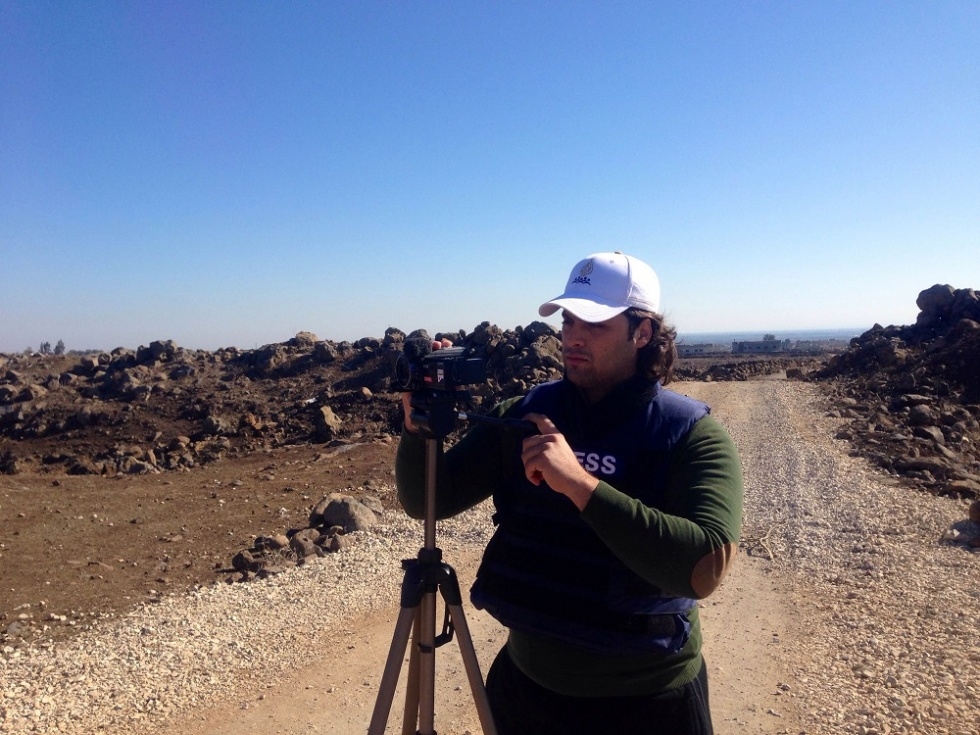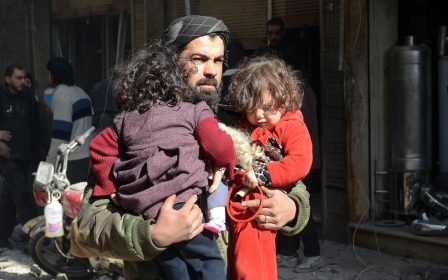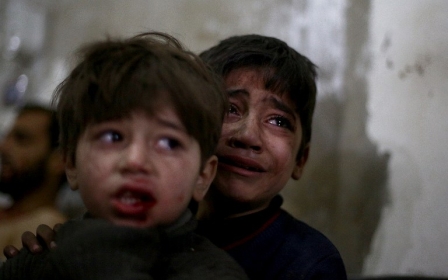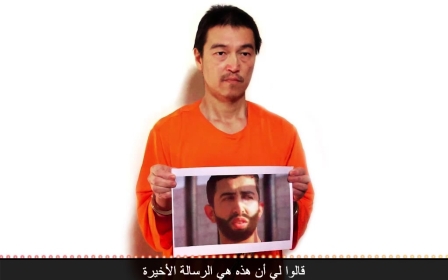What it’s like being a human target in Syria

DARAA, Syria - It was like any normal day: I was at work in Al-Jazeera's office in the southern city of Daraa. The bureau was housed in a residential apartment block, not far from my family home in the neighbouring countryside.
At 11:35am local time exactly, my colleagues and I heard the roar of a helicopter in the sky. We quickly finished what we were doing and rushed to get out of the building to the relative safety of the street.
I heard the sound of the first barrel bomb land nearby, and after a few seconds a second barrel bomb crashed into the office building. I knew that this was no fluke and that we had been purposefully targeted, most likely for the work we had been covering.
It was an awful, indescribable feeling. I can’t remember much of what happened next. It was a big shock, and while I am certainly no stranger to these deadly devices, I recall being frightened and I quickly fell to the ground.
I couldn’t see anything and the dust and smoke from the debris began to choke me as I struggled for breath. While little oxygen made it to my lungs, a wretched stench began to permeate my nostrils. I’m still not sure what the smell was, but I think it was trinitrotoluene, known more commonly as TNT.
My head began to pound and it felt as though it would explode, as though the blast had set off a series of chain reactions set on killing me. For a while, I was certain I was going to die.
What must have been moments later, however, some of my fellow journalists, flagged by fighters from the Free Syria Army, managed to reach me and free me from the rubble. They got me into an ambulance and took me to the emergency department of the Daraa Albalad field hospital.
The medical staff found small shrapnel fragments in my right shoulder and my face and my neck. My shoulder was also badly bruised and I was extremely shaken, but I was incredibly lucky, given the strength and intensity of the blast and my extreme proximity to it.
The medics quickly removed the bomb fragments from my skin. They also helped me to recover from the smoke, dust and dirt I had inhaled. They then worked to clean my ears.
I had been at the hospital only a few days before, but back then I was an observer, a journalist working on a report for the Middle East Eye about the very same doctors who were now working to patch me up and the very same patients who were now my ward neighbours. Even during this difficult time, its staff managed to create a remarkable sense of safety and tranquillity and helped me to feel at home.
It was the fourth time I had been badly injured covering this bloody war, including one very close call in 2013 when a sniper belonging to forces loyal to Syrian President Bashar al-Assad shot me in the leg and another when shrapnel tore through my mouth and tongue. Such injuries do not make one accustomed to the pain or less sensitive to the suffering that continues for others around you.
I’ve always loved cameras and photography and for as long as I can remember I have been snapping away, constantly archiving my life and the lives of my friends and family.
When protests began against Assad and his government in March 2011, my home district of Daraa was centre stage. I travelled from the countryside where my family lives to the centre of the city, where some 10,000 people gathered to demand more freedom and an end to government oppression.
My mobile phone was firmly at my side as I began recording the people who, much like me, were flooding in from the suburbs and the countryside to attend rallies in the city.
Government forces were waiting for us, and there would be no mercy for those who tried to rally. Snipers and police officers began firing indiscriminately into the crowds. Most of us had anticipated some rubber bullets and tear gas canisters, but what happened shocked even the most cynical among us. On that fateful day, 23 March 2011, 65 people were killed and hundreds more injured. Somehow I escaped unharmed, but that day has nonetheless left me scarred.
That bloody demonstration made me decide to focus all my strength and energy into being a journalist, into documenting the lives and suffering of my fellow countrymen. I still feel this sense of duty acutely, no matter how hard or dangerous the work becomes or how hopeless the situation may seem.
In Syria, being a journalist is very difficult and dangerous work; it is also dangerous for our families.
A few months after the initial March protests, my father, aged 60, was arrested because of the work I was doing. The government demanded that I hand over all my files as I had been detailing the deaths, arrests and cases of torture, but I refused to budge. After a short while my brother was also arrested, although both have long since been released.
I am from the town of Khirbet Ghazaleh, in eastern Deraa, and my town was taken by Assad’s forces in May 2013. It is still being held and has been emptied of inhabitants. Just last week, I saw on updated Google Earth images that my family home had been completely destroyed. It looked as though a bomb had been planted inside the house, as the blast seems to have come from within.
Only some other houses in my town were destroyed and these were mostly homes belonging to senior rebel leaders. It was well know that I was working for opposition media and Al-Jazeera at the time, and I believe that’s why all the homes on my street are still standing, mine isn't. The government was sending me a message.
For years, journalists in Syria have been purposefully targeted by Assad’s forces, as I believe I was when the snipers took aim at my leg and that morning of 2 February when the barrel bomb levelled my office. Journalists working on both sides have been injured and killed, and even used as bargaining chips by groups like Islamic State.
Despite all this, I feel comfortable when I move through this world and see and feel exactly what the people around me do. I have this inexplicable desire to try to convey the truth; to follow the events on the ground and document this great suffering of a people who are all too often ignored by the international community, which only sees a small fragment of this brutal war in which more than 200,000 people have been killed, whole cities levelled and millions more made homeless.
I may have to lay down my camera for a while to rest and heal, but I know that as long as this war goes on, I - and other Syrian journalists like me - will be back to try to carry out our duty and document this war to the bitter end.
New MEE newsletter: Jerusalem Dispatch
Sign up to get the latest insights and analysis on Israel-Palestine, alongside Turkey Unpacked and other MEE newsletters
Middle East Eye delivers independent and unrivalled coverage and analysis of the Middle East, North Africa and beyond. To learn more about republishing this content and the associated fees, please fill out this form. More about MEE can be found here.




